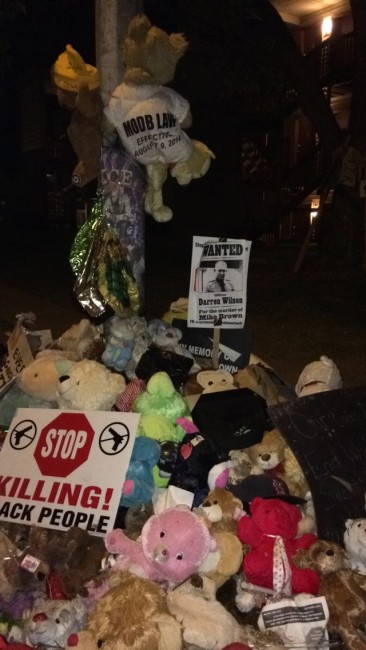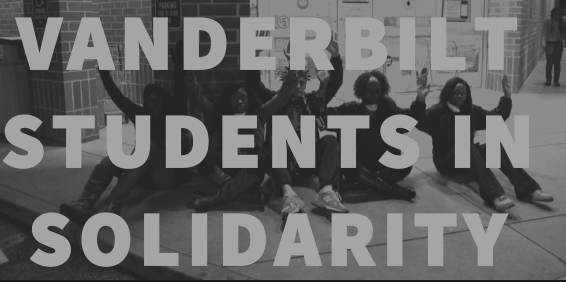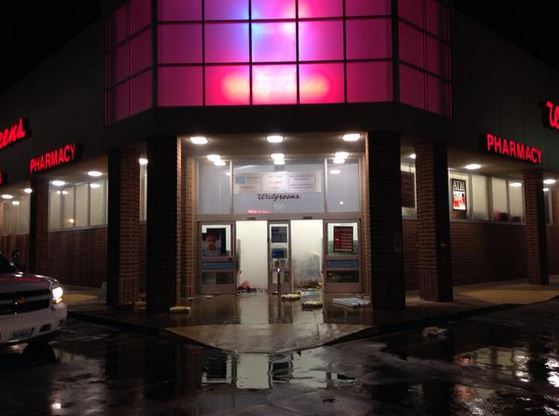A Return to Ferguson
Welcome back. If you’re just tuning in, you can catch the first part in my chronicles of Ferguson here.
A week and a half later we got the chance to go back. On the same Wednesday that we were to depart, the Vanderbilt NAACP hosted the first demonstration on campus pertaining to Ferguson. A dozen of us or so staged a “die-in”, in which we laid on the floor of Rand to simulate those killed at the hands of the police. Meanwhile, a member of VSW performed a powerful spoken word piece. Although we were small in number, we still attracted much of the lunchroom. I was pleasantly surprised to see the diversity of the “bodies” because rectifying race relations is a cross we all have to bear.
Flash forward several hours later and we are joining a crowd of hundreds in front of the Ferguson police station. We had just visited Mike Brown’s memorial, which consisted of gifts and messages of hope from all around the world that stretched an entire block, and were in a solemn mood. As we arrived, the police were charging the protesters, hitting and arresting whoever they could. (However, they especially targeted the people leading the chants and playing the drums.) Water bottles were stupidly being thrown and fears of tear gas and/or pellet gun retaliation made people retreat. Then came relative calm. Just like the battles of yore, the police numbering hundred and decked out in riot gear and the protesters stood in long, seemingly impenetrable lines on opposite sides of the street. This process repeated many times through the night, where protesters’ advances were met with further police charges.

In one of my stereotypical moments of idealism, I decided to walk over to the line of police officers and have a heart to heart with them. I felt that the protests were too polarizing and that demonizing the entirety of the police force was not productive. Maybe I was delirious from lack of sleep but I thought that maybe one officer would admit his/her true feelings. Alas, they cursed at me, commanded me to get back on the other side of the road, and then sent a group from behind the barricades to arrest me. I promptly ran back to the protesters’ side for refuge.
I was touched by the sense of community and camaraderie among the protesters. Many had been out there every night since day one and obviously had many interesting stories to tell. One woman made us all hot chocolate and provided socks and toe warmers while regaling us with tales of being eight months pregnant and protesting nuclear silos back during the ‘70s. Her daughter got arrested last summer for filming police at a Treyvon Martin protest. One journalist quit his job of three years to come to Ferguson and provide live feeds of the protests every night. There was a very enjoyable group of Muslim students from Nashville who provided unique outlooks. One girl recounted her harrowing stories as an activist in Egypt before and after Mubarak fell.
At one point, a few sharp-dressed Panthers led a march down the main drag. One highlight was initiating a sit-in with my friends from the Vanderbilt cadre on the doorstep of the local Walgreens. In one month’s time, that same store will have been reduced to ashes.


While my interactions with the demonstrators were overwhelmingly positive, there were some actions that rubbed me the wrong way. Some yelled homophobic slurs and overly vitriolic insults at the police. Others were needlessly disruptive and rude to passersby. Factionalism had developed within the movement such that there was no unified, clear direction. Bitter debates raged on between shouting “Black lives matter” and “All lives matter”, for example.
I am extremely proud about how Vanderbilt University handled things after the two null-indictments were released. The Provost sent out a campus-wide email, detailing events hosted by several student orgs to protest as well as stimulate dialogue. During the week after Thanksgiving Break, I joined hundreds across campus in a stand-in. On another day, a hundred fellow Commodores (which included students and faculty) and I took part in a cross-campus protest. Even as we blocked up traffic on the main drag, the police were extremely supportive and made sure that we were safe. It was an amazing day.
And as for the actions of the “protesters”, it maddens me that those supporting the null indictment continuously conflate rioting and looting with the decision as if these actions justify it. Brown’s not out there doing all of this, and his mother publicly denounced such destruction of property. I placed “protesters” in quotation marks because the media focuses on the actions of a violent minority and attributes them to the movement in general. Since I protested myself, I can personally confirm that the vast majority preached non-violence.
Looking back, I’m still surprised that Eric Garner wasn’t the figurehead of the burgeoning anti-police brutality movement; I guess no one would have expected something as heinous as a null-indictment and thus didn’t even consider the need to protest to ensure that there would be a trial and a conviction. (That being said, the null indictment of Garner did generate a lot of protest and #icantbreathe is now as omnipresent as #handsupdontshoot.) Ferguson was different. Without video coverage and considering that the eyewitness reports were contradictory, people realized that we needed to support Mike Brown and perhaps that is why focus was drawn to him. The bottom line is that Mike Brown was unarmed and shot many more times than was necessary to incapacitate him. That alone deserves a trial. No matter where someone stands on whether Brown wrestled with Wilson or whether Brown charged Wilson, it should be objectively true that a trial would be in order. Some argue that the killing itself wasn’t racially-charged. Whether or not this is true, the handling of the case clearly had a racial dimension. Giving jurors outdated laws on acceptable police force and appointing a prosecutor who didn’t give his full effort and even insensitively apologized to jurors for “taking their lives”, reeks of racial bias; a prosecutor can indict a ham sandwich but apparently not the shooter of an unarmed black kid. Plus, the long string of similar events reinforces the notion that the police’s treatment of blacks as second-class citizens under the law is deeply rooted within society; despite what many whites would like to believe, we in fact do not live in a post-racist America. Therefore, no matter what side one may take on the individual Mike Brown case, the protesters should be viewed as combating this clearly present and evident systemized racism.
My whole life my white privilege allowed me to not worry about or realize the extent of this unequal treatment in our joke of a justice system. The silver lining in all of these tragedies is the dialogue it has sparked that has opened the eyes of white America. This education is important because meaningful, sustainable progress will only be realized if the oppressors and oppressed cooperate. United we stand; divided we fall. So thank you for reading and I sincerely hope that you have gained a new perspective and/or additional understanding.